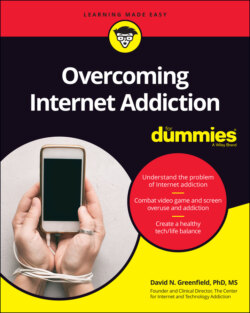Читать книгу Overcoming Internet Addiction For Dummies - David N. Greenfield - Страница 36
Discovering humans’ original addictions
ОглавлениеMany brain structures involved in our survival have to do with pleasure, such as the ventral tegmental area, substantia nigra, amygdala, anterior cingulate, prefrontal cortex, hippocampus, and nucleus accumbens (Chapter 3 has more details). However, the nucleus accumbens (NA), located in the brain’s limbic system, is the major source of the experience of pleasure.
The nucleus accumbens is a dense collection of cells that are specifically receptive to dopamine. Dopamine is one of the major excitatory neurotransmitters responsible for pleasure and movement. So, why would our survival be linked to an excitatory pleasure neurotransmitter? Well, as nature would have it, a mammal’s survival is at least minimally based on the ability to engage in two behaviors on a predictable, consistent, and efficient basis. In other words, nature essentially needs a strong guarantee (from a genetic survival perspective) that can increase the odds of survival. These two behaviors (not surprisingly) are sustenance (eating, and all the behaviors associated with obtaining and consuming nutrition) and procreation (mating). Obviously, adequate nutrition is necessary for effective procreation as well.
The interesting thing here is that food — or more specifically, eating — is highly pleasurable. A strong biological pleasure drive (not just hunger) is linked to consuming food, and this is nature’s way of ensuring that food is consumed. So, when we eat, we experience an associated strong elevation of post-synaptic dopamine in the nucleus accumbens; this flood of dopamine is experienced as pleasure. Just think about your last great meal or the intensity of pleasure your dog seems to experience when eating. Food is extremely pleasurable and satisfying to consume for all mammals. Even without language or consciousness to understand this connection, on a strictly biological level, this pleasure increases the likelihood of a behavior being repeated reliably and consistently — thus ensuring survival.
The same applies to procreation and sex. Obviously, it would make sense to make procreation pleasurable on some level. Not just humans, but all mammals have dopamine linked to their mating behavior. This is nature’s hedge to increase the odds of fulfilling the biological imperative — to get genes transferred into the next generation. This is the basic survival instinct that accounts for at least part of human behavior — the circle of life, if you will.
